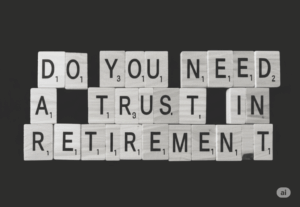August 11, 2021 | Estate Planning
The Consequences of Not Having the Right Estate Plan

These Four Examples Are Completely Avoidable
We may not have control over everything in life, but when it comes to estate planning, there’s a vast toolbox available to ensure that you don’t become the next cautionary tale. Yet somehow, despite ubiquitous stories about the guy who lost everything, or the family in shambles, many people don’t recognize estate planning as the way to prevent these things from happening. Let’s take a look at four of the most common consequences you can avoid with good estate planning:
1. Having no say in major medical issues
It’s a common misconception that estate planning is something you don’t have to worry about until you have kids. Consider this example: Imagine you have a college-aged child away at school who suffers a serious accident. They’re taken to the hospital, but the hospital won’t talk to you because your child is no longer a minor. It’s an unthinkable situation, but it can be prevented with a healthcare power of attorney. It should be part of every kid’s off-to-college planning, ranking right up there with finding the perfect twin extra-long bedding for their new dorm.
But perhaps you’re past that phase, with adult children who have families of their own. There’s still reason to be concerned. But now, the concern pertains to who will make decisions for you in the event of cognitive issues. Without a healthcare power of attorney for yourself, that could be a court.
The bottom line? Every adult in your family—no matter their age—needs a healthcare power of attorney.
2. A court making the important decisions
Maybe you don’t care what happens to your potholders, but surely there are some things you’d like to see in the hands of a specific loved one, like a treasured collection or a family home. However, without a will, the only guarantee is that a court will get to decide. Surely that’s not what you had in mind.
What about minor children? The court would decide that, too. Do you really want that decision in the hands of strangers? That’s why it’s critical to have a will. In addition to indicating the heirs of your possessions, a will can also provide direction for who would be the guardian of your children and who would oversee their financial estate (which can be the same person or two different people).
3. A surviving spouse being left impoverished
This is a situation no one wants to imagine, but it happens more frequently than you think. The culprit is long-term care costs.
While you don’t need to assume you, your spouse, or both will go into a nursing home, you’d be wise to plan for the possibility. That’s because statistics show nearly 70% of the 65-and-older crowd will need some form of long-term care. And the cost is staggering, with a private room in a nursing home averaging over $7,500 per month. Because the figures are so overwhelming—and long-term care insurance so expensive and difficult to find—many people choose to bury their heads in the sand instead of creating a plan. Or, perhaps they’ve visited an estate planning attorney in the past but have a type of trust that offers no protection against long-term care costs, such as a revocable trust (also known as a family trust).
So how can you ensure that a surviving spouse doesn’t lose their home, or suffer a precipitous decline in their standard of living to pay for long-term care? The answer is an asset protection trust. When put in place at least five years prior to when you might need care, assets placed in the trust will be shielded from nursing home costs. It could be the difference between losing your home and keeping it in the event of the worst.
4. Your family being left with a huge tax bill and disagreements
When we pass away, we’d like to think we leave our loved ones with warm memories of our time together. But unfortunately, without an estate plan, sometimes those warm memories are accompanied by big headaches—like infighting and unexpected tax bills.
As we mentioned in the second point, a will can solve arguments about who receives what by clearly outlining your intentions. But a will can’t address the other source of angst: the widow and kiddo penalties.
The widow penalty refers to the change in tax filing status that happens when one’s spouse passes away. The surviving spouse then files at the single rate, which will yield a significantly higher tax bill than married filing jointly. The effects can be minimized with advanced planning. A good estate planning attorney should have you consult with an experienced retirement planner who will help you develop a de-tax draw strategy for your retirement accounts and can advise on whether you ought to consider converting any IRAs to a Roth IRA to take advantage of your married filing jointly rate.
A good estate planning attorney will also have you work with a retirement planner to avoid the kiddo’s penalty. That’s when your adult children or other loved ones pay taxes on your inheritance at a higher rate than the one you enjoy in retirement. Why does this happen? Because they’re in their peak earning years, and likely at the highest tax bracket of their lives. A retirement planner can help you devise a sound gifting strategy and help you adjust it accordingly if tax law changes over time.
While it may seem inconsequential to put off creating or updating your estate plan for one more day, the consequences of being caught without the right plan in place are anything but. Don’t go another day without the protections in place that you and your family need. We’re here to make the process painless and support you every step of the way. Schedule a complimentary phone consultation to learn more.


